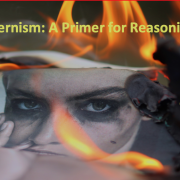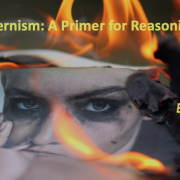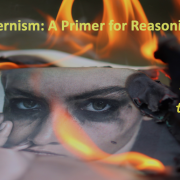Postmodernism: A Primer for Reasoning Minds | Part 8 – If You Wish Violence on People You Disagree With, You’re Already Infected
Within the postmodern framework, a desire to be reasonable and adhere to logic and consistency is taken as evidence that one possesses an ideology driven by the need to maintain one’s position as a oppressor in an antiquated power structure. To ascribe to reason as a standard for pursuing desirable ends is taken by postmodernists as de facto evidence of one’s moral or ideological corruption. The assertion is that to demand reason as a foundational aspect of making choices and pursuing values is to reveal oneself as an enemy of social justice theory, critical race theory, intersectionality, and the broader postmodernist agenda.
As Dr. James Lindsay, co-author of Cynical Theories, puts it,
Anytime you are working with postmodern epistemologies, there’s no reason to expect consistency. They reject consistency as a bug in the system. They are unrepentant about being inconsistent. … The idea that you would be consistent is one of the ideas that would be caught up in the Western philosophical tradition, as they would phrase it. It’s caught up in the exact tradition that was bred of white and male power, and so that needs to be disrupted because, from the perspective of this worldview, that power inherently corrupts. More importantly, [from this worldview, consistency] inherently always acts to preserve and maintain and legitimize itself. The demand for consistency becomes in itself an act of oppression against people.
Transcribed from Jordan B. Peterson, Interview with the Grievance Studies Hoaxers, January 11. 2019, @ 27:00 minutes, https://youtu.be/xWhuQOVTFGw
We see amongst all of these postmodern ideological groups increasing opposition to freedom of thought and its corollary, freedom of speech, and the vilification of the modern enlightenment idea that others should be allowed to express their ideas—especially when exercising their right to speak truth to power—in public forums, be they social media platforms, university campuses, or ideologically-approved news and opinion shows. This movement to silence dissention has acquired the moniker ‘cancel culture.’
The rationalization that physical violence against spoken words is justified is embedded in the supposed universal sloganistic assertion of postmodernist thought that speech is itself a violent act, and therefore a physically violent response or a crusade to impose reputational and economic harm upon individuals is a valid act of self-defense and appropriate and deserved social justice.
The childhood phrase that sticks and stones may break my bones but names will never hurt me, is out. For postmodernists, to have a negative emotional response in the form of taking offense to uttered words is a validated trigger that justifies violence and total vindictive cancellation of people. The encouragement of violence and malevolent anger is the totalitarian essence of cancel culture. This becomes a self-justifying rationalization for postmodernist ideologues to shut down speech by speakers they disagree with or deem harmful to their ideology, void of any objective standards of truth and justice, as a form of preventive self-defense of their ideology and a proactive counter measure to attempted cancellation of their beloved grievances and power lust.
Note also that in order to justify violence at any time and under any condition, not only do postmodernists assert that speech is violence, they also assert at the same time that “silence is violence.” Put the two together and you end up with the postmodernist demand for mob violence against anything they decide they do not like, i.e., anything they feel like attacking to assert fear and power over others. In other words, their message of praxis—their call to action—is that if you don’t say or do what they demand of you to say and do, they will hurt and destroy you. They want your existence and welfare to be dependent on their whim of the moment, on their political agenda—they want to assert themselves as your metaphysical reality—which they non-ironically perceive to be logically consistent with their postmodern ideology by virtue of the Principle of Explosion, although they don’t acknowledge this explicitly.
As a real example in the political realm, type “Trump Accountability Project” in your preferred search engine. To see what’s going on in the “objective” world of science, type in “Cancel Culture Comes to Science.” Then type in “Cancel Culture comes to Comedy.” For a more general perspective of how postmodernism affects the search for truth and toleration for research and open discussion, type in “Cancel Culture is Good.” Type “Lindsay Shepherd” into your search engine and review the case of institutional bullying against a young teaching assistant by ideologically driven and dishonest professors and administrators at Canada’s Laurier University, and find out what she did to “deserve” having her life turned upside down with righteous justification by postmodern ideology at work. This kind of behavior by so-called professionals in positions of moral leadership is neither healthy nor normal. It is cult-like, deviant, inherently dishonest, and authoritarian in design. Particularly insightful is the Jordan Peterson podcast “Deconstruction: The Lindsay Shepherd Affair” available on YouTube.
You can find more egregious examples of the debilitating effects of postmodernist irrationalism and impulsiveness if you start paying attention to the content of daily news stories and the language of politicians, bureaucrats, pundits and critics. Search “Trudeau Brands Canada Systemically Racist.” Postmodernist reflex has become the standard go-to ideology wherever you see an attempt to rationalize injustice by means of hurting other people, taking their stuff, and destroying what they’ve built and what they love.
Postmodernism has likely infected the minds of individuals heard making reference to systemic racism where it doesn’t exist, seen cowering and virtue-signaling to victims who were never personally victimized, and mouthing demands as alleged justice for reparations or compensation to some as an unearned benefit to be taken from others who are presumed to be guilty but in fact are innocent of the alleged charges and have demonstratively played no part in the injustices for which they are being accused and vilified.
Postmodernist ideologues find the normal speech of others so mentally corrosive and intolerable that they require physical “safe spaces” to protect what is, by their own admission, their extremely fragile and unhealthy psychological state. Instead of recognizing the signs of cognitive distress and seeking professional help if needed and appropriate, they elect to band together in roving, threatening, dysfunctional gangs supported by the presidents and deans and faculty of colleges and universities and other professional agitators. By encouraging violence and self-esteem-destroying dysfunctional behavior, they ignore their professional and governance accountabilities and thereby implicitly or explicitly lead or turn a blind eye to students seeking opportunities to “cancel” through violence and slander those whom they disagree with or who simply and properly stand for the search for truth and discovery through reasonable evidence, argument, and civilized interaction.
Reasonable and rational people living freely under a rubric of social cooperation—people who reflect a liberal tradition of joining with others in their communities to live happy and productive lives with family, neighbors and friends, are now beginning to worry and live in fear of lurking postmodernist-inflicted minds and mobs and their professional apologists in government and media and other positions of power and influence who have no gumption about instigating economic and physical aggression and coercion towards anyone who signals opposition to their Chinese Cultural Revolution-inspired behaviors. The cultural influence of postmodernism and its potential for economic destruction and social disruption far exceeds its small number of activists. Postmodernism is a lurking ideology and many who experience its mob mentality in action are too afraid to stand up for their beliefs.
We see the behavior that results from postmodernist thinking at the extremes by politicians in their irrational temper tantrums, and their increasingly observable moral lack of will to acknowledge individual unalienable rights and their refusal to acknowledge that political violence is an illegitimate and inappropriate means for dealing with others in our institutions, communities, places of business and public spaces. Collectivism in politics cancels individualism in ethics. It’s “do as we say,” not “do as you think.” Thinking is not conducive to postmodernism, and to be caught doing so—to stand alone against the mob—is a dead giveaway that being cancelled is existentially deserved and necessary. Authoritarians despise and fear individualists, and postmodern politics is increasingly a blood sport.
Totally irrational thinking is more frequently on display, as is what I would classify as abnormal, deviant, and cognitively debilitated behavior over issues that on the face of it seem benign to normal people, and yet are escalated immediately by an increasing number of people to levels that reveal nihilistic postmodernist thought. Postmodernist babble is increasingly coming out of the mouths of political and business leaders. Trendy falsehoods are spoken without shame as if what was being said and advocated was true and just and obvious to all.
The markers and underpinnings of a postmodern viral infestation are becoming increasingly visible. Individual people are identified, targeted, and attacked psychologically and physically for expressing “bad” or “outdated” thoughts as demonstrated by such punishable behaviors as the hats the wear, the branded merchandise they purchase, the flags they fly, the restaurants they visit, the friends they have, even who they talk to, compliment, or demonstrate affection towards while at work, as in the case of hug in public between Republican Lindsey Graham and Democrat Dianne Feinstein. (Type “Graham Feinstein Hug” into your search engine.)
To be privy to a window on what the insanity of postmodernism as a theory sounds like when it is expressed as a movement through classroom discussion and conversions, I encourage you to watch this YouTube video of recordings made following the Bret Weinstein incident at Evergreen College. (“The Complete Evergreen Story (22)” by Benjamin A. Boyce, https://youtu.be/oXShnCWQTCo)
Next: Part 9 – Challenging Postmodernism on the Front Line
Some video resources for further insight about Postmodernism on the march:
1. WSJ, Violent UC Berkeley Protests Force Cancellation of Breitbart Writers Talk, 2017. https://youtu.be/PwFzOW2tZf0
2. Real Time with Bill Maher: Jordan Peterson, 2018. https://youtu.be/8wLCmDtCDAM
3. Tucker Carlson segment on Fox News featuring Christopher Rufo of the Discovery Institute, 2020. https://youtu.be/rBXRdWflV7M
© 2021, Barry L. Linetsky. All Rights Reserved.
Barry Linetsky is a Partner with The Strategic Planning Group in Toronto, Canada, where he and his colleagues have been helping executives and owners define and align their business purpose with customer values since 1994. Barry is the author of the acclaimed business biography The Business of Walt Disney and the Nine Principles of His Success (Theme Park Press). His two most recent books, Understanding and Creating Vision and Mission Statements and Understanding and Creating Strategic Performance Indicators and Business Scenarios, co-authored with Dobri Stojsic, are available from amazon. The third book in the series Understanding and Creating Critical Success Factors will be available soon. Barry’s thought-leadership articles have been published by Ivey Business Journal, Rotman Magazine, Mises Wire, and the Economist Intelligence Unit in conjunction with Harvard Business School. Barry is also a writer, researcher, analyst, photographer, and business strategy enabler. Read his blog and learn more at barrylinetsky.com. Follow him on Twitter @BizPhilosopher.



 © 2021 Barry L. Linetsky. All Rights Reserved
© 2021 Barry L. Linetsky. All Rights Reserved







Leave a Reply
Want to join the discussion?Feel free to contribute!